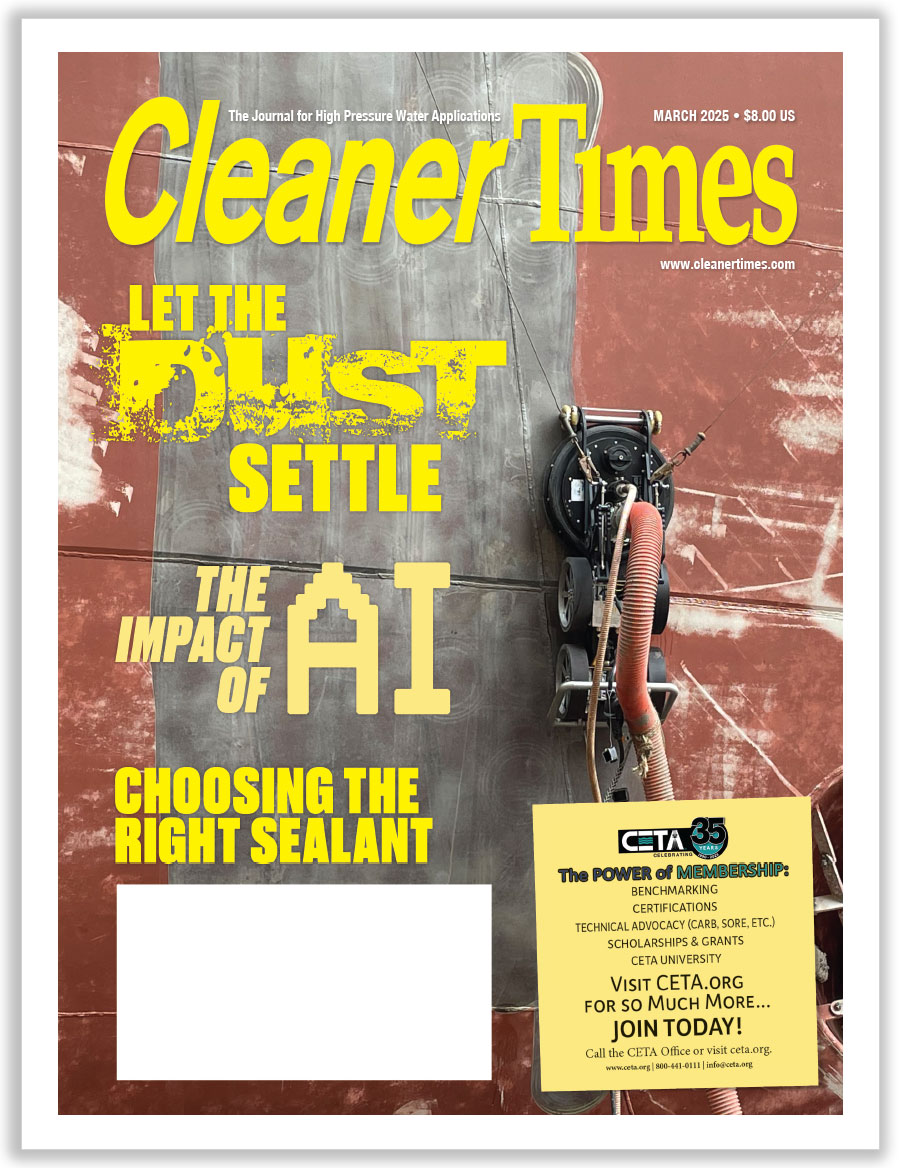
Financial
Year-End Planning for Tax Savings Under the TCJA
By Mark E. Battersby / Published February 2019

Last December’s 2017 Tax Cuts and Jobs Act (TCJA) presents both a challenge because of its wide-ranging scope and an opportunity to reap a share of that law’s much-touted tax savings. Small businesses, especially those in the pressure washing industry, should begin seeing the promised tax savings when the tax returns for the 2018 tax year are filed but can benefit from the full potential of the TCJA only by planning now.
Every contractor, distributor, and manufacturer undertaking tax planning should be aware the federal corporate tax rate has been streamlined to a flat 21 percent. A new 20 percent deduction for “qualified” income from pass-through businesses may, however, have some S corporation owners and partners in partnerships thinking of changing the entity of their businesses as they could face a tax rate as high as 29.6 percent. But, more about that later.
Profits From Change
Among the areas every power washing business owner and manager should be thinking about before the end of the tax year are the following:
- Write-Offs. A business is now allowed to fully write off the entire cost of new purchases utilizing 100 percent “bonus” depreciation. With bonus depreciation, the cost of vehicles, equipment, computers, and furniture can be written off in the year placed in service—in lieu of depreciating the cost over a number of years. There is also the increased Section 179, first-year expensing write-off that has been doubled from $500,000 to $1,000,000. Section 179 now also includes fire protection, alarm systems, and security systems.
- Repairs. In 2013 the IRS issued new regulations that kicked in during the 2016 tax year and impact every pressure cleaning business with fixed assets. Today, the so-called “de minimis” safe harbor deduction for materials and supplies has been increased from $500 to $2,500, at least for those businesses without an applicable financial statement. It is not too late to update the pressure washing operation’s policy for differentiating repairs from capital expenditures to comply with the updated regulation.
- Abandon—Don’t Sell. If equipment or other assets are of no value to the business, the benefits of abandoning it rather than selling might be rewarding. Abandonment could generate an ordinary, fully deductible loss, rather than treating the loss as a capital loss, which is subject to limitations. Of course, abandonment must be documented, and the property must really be abandoned.
- Writing Off Entertainment. Business-related entertainment, amusement, or recreational expenses are no longer deductible after the TCJA. Business meals, of course, remain 50 percent deductible.
- Family and Medical Leave Tax Credits. As part of the TCJA, employers are now able to claim a tax credit, a reduction in the pressure cleaning operation’s tax bill (as opposed to a deduction in the income that tax bill is based on) on wages paid to qualifying employees while they are on family or medical leave. In order to claim the credit, there must be a written policy that provides at least two weeks of paid leave annually to all qualifying employees who work full time. What’s more, the paid leave must be no less than 50 percent of the wages normally paid to the employee.
- Limiting the Deduction for Business Interest. The TCJA placed new limits on the deduction for business interest, restricting the deduction to 30 percent of the operation’s adjusted gross income. Questions remain about what constitutes investment rather than business interest and how the limit should be applied to pass-through entities and consolidated groups. Note: corporate debt is considered to be business interest rather than investment interest.
Fortunately, an exception exists for small businesses (those with gross receipts that have not exceeded a $25-million threshold for a three-year period) designed to protect their ability to write off interest on loans to start or expand the business, hire workers, or increase paychecks. - Vehicle Expenses. What percentage of a vehicle used in or by the pressure washing business is attributable to business usage? Whatever the percentage, that amount may qualify as an auto expense. The IRS allows two ways to calculate the deduction. First, there is the actual expense to which the percentage is applied to create the business auto expense deduction. Or, track the actual mileage for business purposes and use the 54.5 cents per mile standard write-off.
- Don’t Forget Those Carryovers. Deductions for capital losses, net operating losses, home office deductions, and even large charitable donations that cannot be fully used in one year may be carried forward to future years. These items have a way of slipping through the cracks, especially when switching tax preparers. Because these items are easily for- gotten, make sure to track these deductions and note carryovers from the current tax year’s return. Net operating losses (NOL) carrybacks, of course, are no longer permitted.
Reasonable Compensation and Bonuses
Paying bonuses and ensuring the operation doesn’t overpay an owner, manager, or key employee can be complicated. Paying bonuses early or creating a separate bonus payroll might simplify things.
The owner of an incorporated pressure washing business who works in the operation might want to carefully consider his or her salary. S corporation owners benefit from a low salary because amounts that aren’t salary escape payroll taxes.
On the other hand, owners of regular ‘C’ corporations generally benefit from a higher salary and lower distributions. While employment taxes are paid on the salary, the earnings paid as salary are only taxed once. Earnings that are distributed as dividends are taxed twice, once at the corporate level and a second time at the individual level.
The IRS frequently challenges salaries if they deem them unreasonable. While factors used by the courts to determine reasonable compensation vary, the IRS typically looks at training and experience, duties and responsibilities, time and effort devoted to the business, dividend history, employee payments and bonuses, compensation agreements, the amount paid by comparable businesses for similar services, and the use of a bonus formula.
The Pass-Through Conundrum
To even the playing field for incorporated pressure cleaning businesses with their new 21 percent corporate tax rate, the TCJA created a 20 percent deduction for income earned from pass-through entities such as sole proprietorships, partnerships, and S corporations. While eligible taxpayers may be entitled to the deduction of up to 20 percent of qualified business income (QBI), for those with taxable income that exceeds $315,000 for a married couple filing a joint return, or $157,500 for all others, the deduction is subject to limitations.
If a taxpayer’s income exceeds the limits, the exceptions apply to pass-through entities involving the performance of services in a number of fields such as health, law, and accounting and those where the principal asset is the reputation or skill of one or more of its employees.
Pass-through owners will also need to pay close attention to some removed deductions (including personal exemptions and the deduction for state and local income tax) and the increased standard deduction.
Planning Before Year-End
Though the end of the pressure washing operation’s tax year has come for 2018, several general rules might help guide it to real tax savings—savings that will be consistent, year after year:
- Don’t spend money simply to reduce that tax bill. After all, $1 spent does not equal $1 worth of tax saved or create a $1 deduction. Also, keep in mind that if those accelerated deductions result in a net operating loss (NOL), as mentioned, it can now only be used to offset tax bills down the road.
- Know thy accounting method. Most year-end tax strategies work best for cash-basis taxpayers. Accrual-basis businesses report all income in the year it is earned and all expenses in the year they are incurred. So, just because the pressure cleaning business is paying for a 2019 expense in 2018 doesn’t always result in an immediate deduction on the 2018 tax return.
- Chart a “pro forma” analysis of the operation’s tax liabilities for 2018 using the new rules, deductions, and credits. By using estimated income and expense figures, this should not be too difficult. Otherwise, the true impact of “reform” will not be known until the tax return is prepared, when it may be too late to make any moves to reduce it.
- Don’t forget the business’s entity. Depending on whether the pressure cleaning business files as a “pass-through” entity such as an S corporation or partnership, or as a regular ‘C’ corporation, significant tax savings might be achieved by changing how the operation files. Obviously, this is not something that happens quickly, meaning the numbers should be run now.
Once the work is done and the alternatives tested, do you opt for a series of aggressive year-end tax strategies? Above all, make sure the business is actually spending money and not just moving it around, as otherwise, how can anyone hope to know how much the tax reform bill will affect them? If the pressure cleaning operation’s tax professionals are not already involved in the planning process, now might be a good time to enlist their aid.





